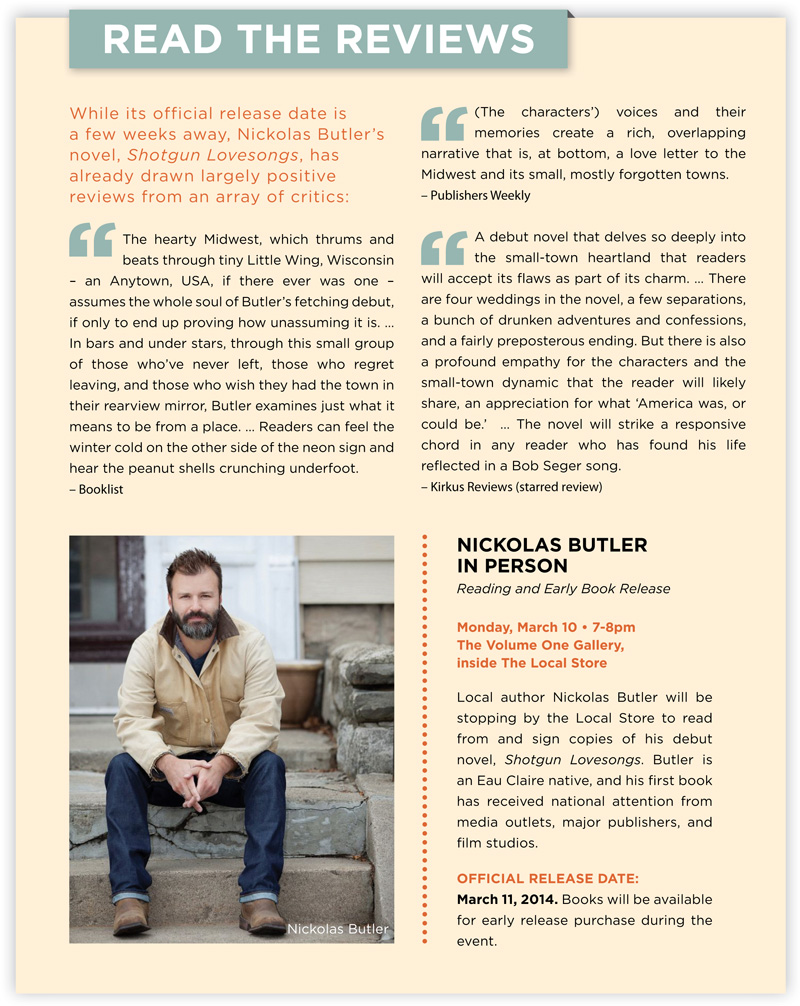An Excerpt from Shotgun Lovesongs
a peek at Chippewa Valley author Nickolas Butler’s debut novel
V1 Staff |
Listen to the excerpt
Listen to an excerpt from Nickolas Butler's Shotgun Lovesongs audiobook. The program is read by Ari Fliakos, Holter Graham, Scott Shepherd, Scott Sowers, and Maggie Hoffman.
an excerpt from
SHOTGUN LOVESONGS
by Nickolas Butler
Published March 2014 by Thomas Dunne Books, an imprint of
St. Martin’s Press, New York. Reprinted with permission of the author.
~
WE INVITED HIM TO ALL of our weddings; he was famous. We addressed the invitations to his record company’s skyscraper in New York City so that the gaudy, gilded envelopes could be forwarded to him on tour—in Beirut, Helsinki, Tokyo. Places beyond our ken or our limited means. He sent back presents in battered cardboard boxes festooned with foreign stamps—birthday gifts of fine scarves or perfume for our wives, small delicate toys or trinkets upon the births of our children: rattles from Johannesburg, wooden nesting dolls from Moscow, little silk booties from Taipei. He would call us sometimes, the connection scratchy and echoing, a chorus of young women giggling in the background, his voice never sounding as happy as we expected it to.
 Months would pass before we saw his face again, and then, he would arrive home, bearded and haggard, his eyes tired but happily relieved. We could tell that Lee was glad to see us, to be back in our company. We always gave him time to recover before our lives resumed together, we knew he needed time to dry out and regain his balance. We let him sleep and sleep. Our wives brought him casseroles and lasagnas, bowls of salad and freshly baked pies.
Months would pass before we saw his face again, and then, he would arrive home, bearded and haggard, his eyes tired but happily relieved. We could tell that Lee was glad to see us, to be back in our company. We always gave him time to recover before our lives resumed together, we knew he needed time to dry out and regain his balance. We let him sleep and sleep. Our wives brought him casseroles and lasagnas, bowls of salad and freshly baked pies.
He liked to ride a tractor around his sprawling property. We assumed he liked feeling the hot daylight, the sun and fresh air on his pale face. The slow speed of that old John Deere, so reliable and patient. The earth rolling backward beneath him. There were no crops on his land of course, but he rode the tractor through the fallow fields of prairie grasses and wildflowers, a cigarette between his lips, or a joint. He was always smiling on that tractor, his hair all flyaway and light blond and in the sunlight it was like the fluff of a seeding dandelion.
He had taken another name for the stage but we never called him by that name. We called him Leland, or just plain Lee, because that was his name. He lived in an old schoolhouse away from things, away from our town, Little Wing, and maybe five miles out into the countryside. The name on his mailbox read: L SUTTON. He had built a recording studio in the small, ancient gymnasium, padding the walls with foam and thick carpeting. There were platinum records up on the walls. Photographs of him with famous actresses and actors, politicians, chefs, writers.
...
Lee’s success had not surprised us. He had simply never given up on his music. While the rest of us were in college or the army or stuck on our family farms, he had holed up in a derelict chicken coop and played his battered guitar in the all-around silence of deepest winter. He sang in an eerie falsetto, and sometimes around the campfire it would make you weep in the unreliable shadows thrown by those orange-yellow flames and white-black smoke. He was the best among us.
He wrote songs about our place on earth: the everywhere fields of corn, the third-growth forests, the humpbacked hills and grooved-out draws. The knife-sharp cold, the too-short days, the snow, the snow, the snow. His songs were our anthems—they were our bullhorns and microphones and jukebox poems. We adored him; our wives adored him. We knew all the words to the songs and sometimes we were in the songs.
…
Lee came home from Australia, as run-down and misspent as we’d ever seen him. We let him be a few days, like we always did, and then my wife, Beth, invited him over to our farm for dinner and a bonfire. He always seemed to like playing with our children and the fact that we didn’t have cable television, that in fact our only television was an ancient model inherited from my parents that looked more like a gigantic piece of wooden furniture than something that might actually connect us to the outside world. We owned a newish record player though—I collect old vinyl—and he always blushed as he passed it and noticed one of his LPs underneath the needle. Our kids knew all the words to his songs.
The kids squealed that night as they saw the headlights of Lee’s old truck come down our driveway toward the house. They ran in circles and galloped, singing out all his trademark lines with gusto.
“All right, all right, all right!” Beth said, laughing. “Enough. Now you’re gonna give Uncle Lee some room. He’s tired, all right? He just got home from Australia. So don’t pester him too much.” Shooing them away from the front door, she checked her reflection in the mirror, pursed her lips, and ran her fingers quickly through her hair.
He came to the door carrying a bouquet of carnations that were obviously bought in a hurry from the IGA. Beth took the flowers and they hugged. He had grown skinny over the years and his hairline was quickly receding, though he let the strands grow long. He had a beard and his forearms were scattered with tattoos.
“Hey buddy,” he said, grinning at me. “Good to be home. Missed you a ton.”
Lee always gave good hugs. I felt his rib cage against my own, his long arms around me. The smell of tobacco in his beard and in his hair.
“We missed you too,” I said. Then the children attacked him and he fell to the floor in mock defeat. Beth and I went to the kitchen and brought the meal out to our old dining-room table, where there were candles already lit. Beth went to the turntable and flipped his record, placed the needle in the wide black groove at the edge.
We heard Lee groan from the entryway as he stumbled toward us, dragging Eleanore and Alex, his arms underneath their armpits, and shaking his head. “Let’s listen to something else, huh?” he said. “I’m so friggin’ tired of myself.”
If You Believe the Hype ...
If you believe the hype – and, considering the quality of the material being hyped, belief might be your best option – Chippewa Valley author Nickolas Butler’s debut novel, Shotgun Lovesongs, is poised to make a literary splash. Whether or not it cracks the best-seller lists, however, and whether or not a planned film adaptation finds its way to multiplexes, Shotgun Lovesongs is sure to have reverberations far beyond the corner of Wisconsin that inspired it.
Such reverberations will, of course, be most strongly felt here in the Chippewa Valley, where Butler grew up (he’s a Memorial High School graduate) and to which he recently relocated with his wife and two children. “Write what you know” is clichéd literary advice, but it’s advice that served Butler well: At its heart, his novel is about 30-something men and women in a fictional Wisconsin town called Little Wing and their lifelong, but sometimes frayed, bonds of friendship. It’s a bittersweet love letter to small-town life, a study of how the beer-buzzed youths who watched dawn break from atop the abandoned feed mill clamber down to navigate the joys and sorrows of adulthood – marriage, divorce, children, success, failure.
If you’re from around here, you may recognize some of the characters – and not just because one of them was inspired by our real-life small-town rock star, Justin Vernon of Bon Iver. These are people whose love for their hometown held them fast there, and others who were drawn back to find refuge or to prove themselves. The excerpt published here, narrated by Hank – a farmer and family man who seems to be the steadiest of the bunch – introduces the musician, Lee, who seeks solace from the stresses of fame by returning to his hometown. If this whets your appetite for more, you won’t have to wait long: Thomas Dunne Books, an imprint of St. Martin’s Press of New York, will release the book March 11, but it will be available on March 10 at The Volume One Gallery, where Butler will read from the novel and sign copies. – Tom Giffey, Volume One
























